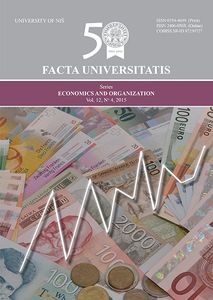APPLICATION OF XBRL-a IN THE FUNCTION OF IMPROVEMENT OF QUALITY OF FINANCIAL REPORTING IN MONTENEGRO
APPLICATION OF XBRL-a IN THE FUNCTION OF IMPROVEMENT OF QUALITY OF FINANCIAL REPORTING IN MONTENEGRO
Author(s): Vladan MartićSubject(s): National Economy, Business Economy / Management
Published by: Универзитет у Нишу
Keywords: XBRL; financial reporting; Internet; company; accounting standards; regulations; stakeholders; Globalization
Summary/Abstract: After more than a century-long and successful history of providing accounting and audit services, the accounting profession is faced with numerous challenges and opportunities of the XXI century. In parallel with the development of new technologies, organizational solutions and establishment of financial reporting standards, a strong expansion of software tools for the exchange of business information has been evident in the last decade. At the end of the nineties of the last century the eXtensible Business Reporting Language – XBRL appeared, which has been one of the most important technological innovations in financial reporting, collection and exchange of data since the invention of electronic spreadsheets. In this sense, the goal of this paper is to evaluate the XBRL aimed at improving the quality of financial reporting, highlighting both positive and negative aspects of this standard for the exchange of business information. However, although the XBRL standard is globally accepted, and it has proved to be a kind of evergreen – which, according to many, promises a revolution in financial reporting and exchange of business information - the fact is that the implementation of this standard has not yet become a reality in Montenegro and the region. Hence, one of the goals of this paper is to point out to the relationship of reciprocity between the application of the XBRL standard in accounting practice with the level of development of accounting regulations, training of professional accountants and the willingness of national standard establishers to accept the need for standardizing financial reporting with respect to the exchange of information. Therefore, we have stated the above so that we could clearly indicate that it is a great scientific challenge to illuminate a new and still unexplored area for our conditions in terms of the application of modern methods of accounting theory and practice. In this context, it will be very interesting to focus on Montenegro, which is moving towards Euro-Atlantic integration, and which has so far had the opportunity to face a number of institutional and regulatory problems which have raised doubts in a way about the use value of financial reporting.
Journal: FACTA UNIVERSITATIS - Economics and Organization
- Issue Year: 12/2015
- Issue No: 4
- Page Range: 279-295
- Page Count: 17
- Language: English

